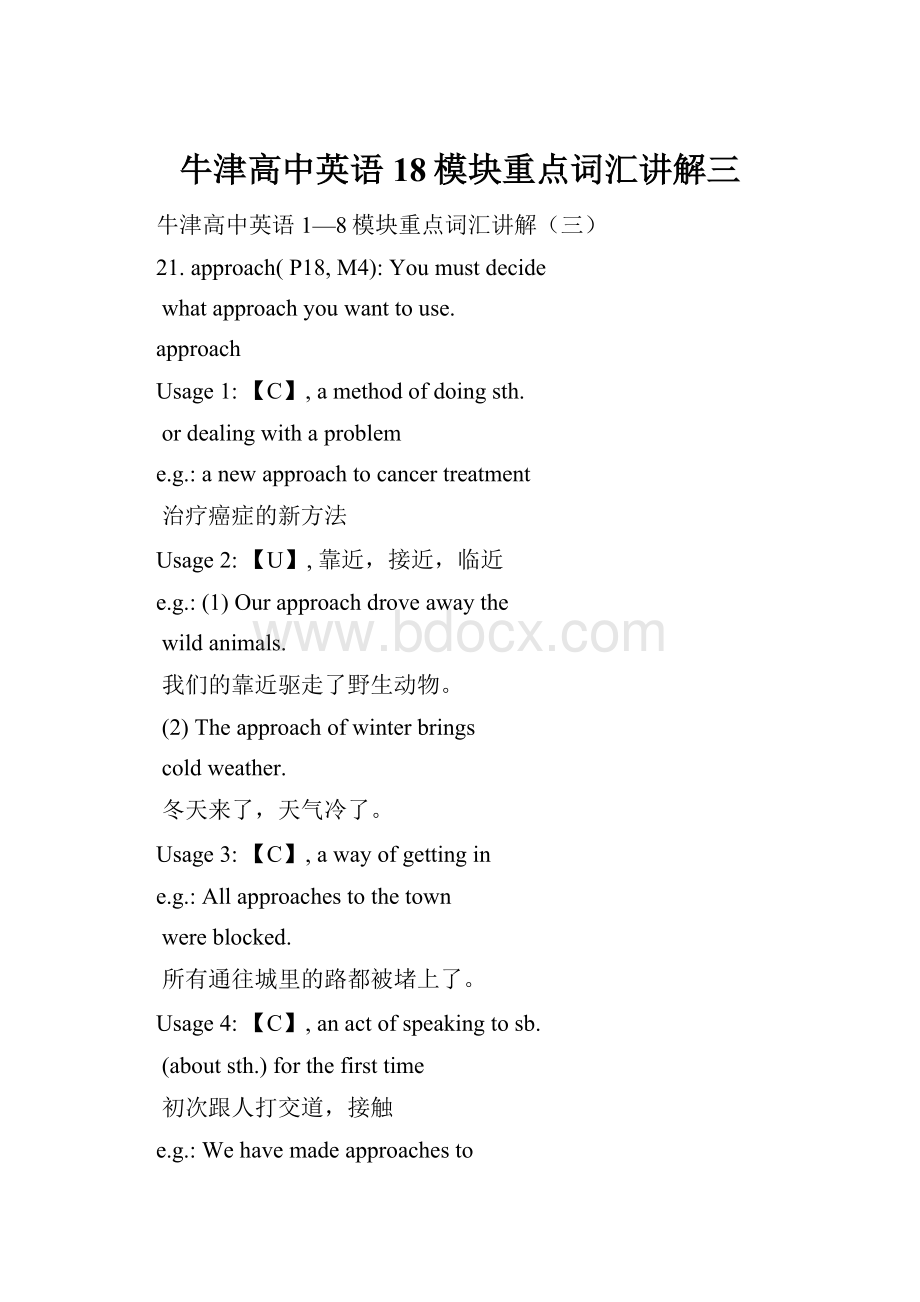牛津高中英语18模块重点词汇讲解三.docx
《牛津高中英语18模块重点词汇讲解三.docx》由会员分享,可在线阅读,更多相关《牛津高中英语18模块重点词汇讲解三.docx(27页珍藏版)》请在冰豆网上搜索。

牛津高中英语18模块重点词汇讲解三
牛津高中英语1—8模块重点词汇讲解(三)
21.approach(P18,M4):
Youmustdecide
whatapproachyouwanttouse.
approach
Usage1:
【C】,amethodofdoingsth.
ordealingwithaproblem
e.g.:
anewapproachtocancertreatment
治疗癌症的新方法
Usage2:
【U】,靠近,接近,临近
e.g.:
(1)Ourapproachdroveawaythe
wildanimals.
我们的靠近驱走了野生动物。
(2)Theapproachofwinterbrings
coldweather.
冬天来了,天气冷了。
Usage3:
【C】,awayofgettingin
e.g.:
Allapproachestothetown
wereblocked.
所有通往城里的路都被堵上了。
Usage4:
【C】,anactofspeakingtosb.
(aboutsth.)forthefirsttime
初次跟人打交道,接触
e.g.:
Wehavemadeapproachesto
themwithaviewtoforminga
businesspartnership.
为了和他们建立商业伙伴关系,我
们进行了接洽。
Usage5:
vi.orvt.,走进,靠近,接近
e.g.:
(1)Silentlyweapproachedthe
enemy’scamp.
我们悄悄地靠近了敌人的营地。
(2)Thetimeisapproachingwhen
wewillhavetoleave.
我们离开的时间到了。
(3)Wehadtoworkintemperatures
approaching35℃.
我们不得不在接近35℃的高温下工作。
(4)He’sagoodplayer,butdoesn’t
approachinternationalstandard.
他是个不错的选手,但还没达到国际标准。
(5)He’sapproaching80.
他快80了。
.
Usage6:
tospeaktosb.,esp.in
ordertomakearequestor
suggestionforthefirsttime
(初次)接洽;交涉;打交道
e.g.:
Didheapproachyouabout
lendinghimsomemoney?
他有没有找你借钱?
扩展:
approachable,adj.,easyto
speaktoordealwith;friendly
易亲近的,易交谈的,易与之打
交道的;友善的;ableto
approach可接近的;能够达到的
e.g.:
You’llfindthedirectora
veryapproachableperson.
你会发现董事长是非常可亲的人。
Usage7:
vt.,tobegintoconsiderordeal
with开始考虑,对付,处理
e.g.:
Thereareseveralwaysof
approachingthisproblem.
处理这个问题有好几种方法。
21.concern(P38,M5):
Asthethird
longestriverintheworld,itis
cleartoseewhytheenvironmental
problemsoftheYangtzeRiverhave
raisedconcernbothnationallyand
internationally.
concern
Usage1:
uncountablenoun,worry;
anxiety担心;忧虑
e.g.:
(1)amatterofconsiderablepublic
concern
公众非常担心的问题
(2)ateacher’sconcernfor
hisstudents
教师对学生的关心之情
e.g.:
(3)Thereisnoreasonforconcern;
yourson’accidentwasnottoo
serious.
没必要担心,你儿子的事故不太严重。
(4)Thereportexpressedserious
concernaboutthedoctor’s
competence.
报告表达了对该名医生能力的极大担忧。
Usage2:
【C】所关切的事;有利害关
系的事
e.g.:
(1)HowmuchmoneyIearn
isnoneofyourconcern.
我赚多少钱与你无关。
(2)apolicythatfailstodealwiththe
concernsofethnicminorities
一项未能针对少数民族人民所关切
之事的政策
Usage3:
vt.,tobeabout与…有关系,涉及
e.g.:
Thearticleconcernsaman
whoiswronglyimprisoned.
这篇文章写的是一个被冤屈而
坐牢的人。
Usage4:
vt.,tobeofimportanceor
interestto;haveaneffecton
与…有关;对…有影响
e.g.:
(1)Theseproblemsconcernallofus.
这些问题关系到我们所有的人。
(2)Thisregulationdoesnotconcern
you,sodon’tworry.
这项规定与你无关,别担心。
(3)Towhomitmayconcern…
敬启者…
扩展1:
concernedadj.
Usage1:
anxious,worried;having
anactivepersonalinterest
.
e.g.:
(1)Hehasneverbeenvery
concernedaboutwhatother
peoplemaythinkofhim.
他从不在乎别人对他的想法。
(2)Iamconcernedfortheir
happiness.
我关心他们的幸福。
(3)Thechildren’smotherwasvery
concernedfortheirsafety
whentheydidn’tcomeback
fromschoolattheusualtime.
当孩子们放学后不能按时回家时,
母亲非常担心他们的安全。
Usage2:
有关的,有牵连的;参与的
e.g.:
(1)Everyonewhowasconcerned
intheaffairregretsitverymuch.
所有参与此事的人都非常后悔。
(2)Ihaveenjoyedmyvisitvery
much,andwouldliketothank
allthepeopleconcerned.
我对访问非常满意,感谢所有有关人员。
(3)I’llpassonyourcommentsto
thepeopleconcerned.
我会把你的评论转达给相关人士。
扩展3:
固定词组:
beconcernedwith:
tobeabout
e.g.:
Thisstoryisconcernedwith
aRussianfamilyinthe19thcentury.
故事讲述的是十九世纪时的一个俄国家庭。
扩展4:
固定词组:
asfarasI’m/you’re,
etc.,concerned
e.g.:
AsfarasI’mconcernedthewhole
ideaiscrazy.
就我而言,整个想法是疯狂的。
扩展5:
wheresomethingisconcerned
就某事而言,在某种事情上
e.g.:
Wheremoneyisconcerned,
Ialwaystrytobeverycareful.
在钱这种事上,我总是力图谨慎。
扩展6:
concerningprep.较正式,关于
e.g.:
(1)Concerningyourrequest,Iam
pleasedtoinformyouthat…
(2)Policeareanxioustohearany
informationconcerninghis
whereabouts.
警察非常想得到有关他的下落的信息。
22.takeon(P11,M6):
Inaninterview,
hetoldusthatheisalwayshappy
totakeonnewforeignstudents.
takeon
Usage1:
接受(工作等;承担(责任等)
e.g.:
MydoctorsaysI’mtootiredand
hasadvisedmenottotakeany
moreworkon.
医生说我太累了,建议我不要再
接受工作。
Usage2:
tostarttoemploy
e.g.:
We’vedecidedtotakeona
newclerkintheaccounts
department.
我们决定在会计部雇用一名新职员。
Usage3:
开始具有(呈现)(某种品质、
面貌等);露出
e.g.:
(1)Theseinsectscantakeonthe
coloroftheirsurroundings.
(2)Hisfacetookonaworried
expression.
扩展1:
takeoff
Usage1:
脱下,脱去(衣服)
e.g.:
Takeyourcoatoff.
相反词:
puton
Usage2:
(飞机、航天器等)
升空,起飞
Usage3:
vi.,tobegintobecome
successful,popular,or
well-known开始有成就;
开始受欢迎;开始成名
e.g.:
Itwasatthispointthatheracting
careerreallytookoff.
她的演艺事业是在此时开始成功的。
Usage4:
tohaveaholidayfromwork
onthestateddayorforthe
statedperiod请假
.
e.g.:
(1)I’mtakingThursdayoff
becauseI’mmovinghouse.
我星期四要请假,因为我要搬家。
(2)Takeafewdaysoff,Michael.
歇几天吧,Michael。
扩展2:
takeovervt./vi.接手,接管
e.g.:
(1)Whodoyouthinkwilltakeover
nowthatthegovernorhasbeen
dismissed?
州长已被免职,你认为谁会接替他?
(2)I’mfeelingtootiredtodriveany
more;willyoutakeover?
我累得开不动了,你来开,好吗?
扩展3:
taketo
Usage1:
tofeelalikingfor,esp.atonce
(尤指立刻)对…产生好感,喜欢上
e.g.:
ItooktoPaulassoonaswemet.
我们一见面,我就喜欢上Paul了。
Usage2:
染上…习惯,嗜好
e.g.:
(1)Allthisgloomynewsisenough
tomakeyoutaketodrink.
这些令人沮丧的消息足以让人去酗酒了。
(2)Justlatelyhe’stakentohiding
hissocksunderthecarpet.
近来,他染上了把袜子藏在地毯底下的习惯。
Usage3:
到(某处)休息;到…躲藏;逃往
e.g.:
(1)Father’sill,sohe’stakentohis
bed.
父亲生病了,所以上床休息去了。
(2)Thecriminalstooktothehillsto
escapefromthepolice.
罪犯们逃到山间以躲避警察。
扩展4:
takeup
Usage1:
tobegintospendtimedoing;
interestoneselfin
e.g.:
Johntookupactingwhenhewas
atcollege.
约翰在上大学的时候开始从事表演。
Usage2:
(事物或事件)占用了
(空间和时间)
e.g.:
(1)ThejobtookupmostofSunday.
这件工作占用了星期天的绝大多数时间。
(2)Theseboxesofyoursaretaking
uptoomuchspace.
你的这些盒子占去了太多的空间。
23.holdup(P42,M6):
Therewas
aboatwecouldgoonbutwe
gotheldupasMr.Hudson
remarkedthattheboatwas
toocrowded.
holdup
Usage1:
todelay推迟,(使)耽搁
e.g.:
(1)Thebuildingofthenewroadhas
beenheldupbybadweather.
糟糕的天气耽搁了新路的修建。
(2)Astrikehasheldupproduction.
罢工延误了生产。
Usage2:
to(tryto)robbyusingthe
threatofviolence
e.g.:
Thecriminalsheldupthebank
andtookallthemoney.
犯罪分子劫持了银行,拿走了所有的钱。
Usage3:
toshowasanexample
e.g.:
Theoldmanalwayshelduphis
youngestsonasamodelof
hardwork.
老人总是把自己最小的儿子当作勤劳
工作的典范。
扩展1:
holdout
Usage1:
tooffer提供;提出
e.g.:
Idon’tholdoutmuchhope
thattheweatherwillimprove.
我对天气好转不爆多大希望。
Usage2:
tocontinuetoexist;last
继续存在,持续,维持
e.g.:
Howmuchlongercanour
suppliesholdout?
我们的供给还能维持多久?
Usage3:
tocontinueinspiteofdifficulties;
坚持,忍住
e.g.:
Thetownwassurrounded,butthe
peopleheldoutuntilhelpcame.
城被困了,但人们一直坚持到救援来。
24.referto(P50,M6):
Iampleasedto
havethechancetodaytotalkto
youabouttheUnitedNationsor
theUN,asitisoftenreferredto.
referto
Usage1:
tomentionorspeakabout
e.g.:
(1)Thescientistreferredtothe
discoveryasthemostexciting
newdevelopmentinthisfield.
这位科学家把该发现称作是此领域内
最令人激动的新进展。
(2)Whichcompanieswasshereferring
towhenshespokeofcompetingfirms?
当她说起竞争商家时,她指的是哪些公司?
(3)Thefiguresintheleft-handcolumn
refertoouroverseassales.
左栏的数据指的是海外的销售额。
Usage2:
tolookatforinformation
参考,查阅,查看
e.g.:
(1)torefertoadictionary
查阅字典
(2)Letmejustrefertomynotes
tofindtheexactfigures.
让我查查笔记,找找确切的数字。
Usage3:
toconcern;bedirected
towardsorberelevantto
有关;针对
e.g.:
Thenewlawdoesnotreferto
landusedforfarming.
新的法规与耕地无关。
Usage4:
refersb./sth.tosb.
提交…给…做决定(处理)
e.g.:
(1)Theshopreferredthecomplaints
tothemakersofthearticles.
商家把投诉转交给了生产厂家。
(2)Theprofessorreferredmetoanarticle
shehadwrittenonthissubject.
教授让我查阅她就这个主题曾经写过
的一篇文章。
(3)Theproposalwillhavetobereferred
totheFinanceCommittee.
这项提议将会转交给财经委员会。
扩展1:
reference
Usage1:
【c;u】,谈到,提及
e.g.:
(1)KingWilliamⅡwasknownas
“Rufus”,areferencetohisredhair.
国王威廉二世因一头红发被称为鲁弗斯。
注:
Rufus系拉丁语,意为“红发”。
(2)WhenIspoketohimaboutthe
expedition,hedidn’tmakeany
referencetoyourcomingwithus.
当我向他说起这次远征时,他并未提到
你会和我们一起来。
(3)Herspeechcontainedonlya
passingreferencetotheproblem
ofunemployment.
她的演讲只对失业问题一带而过。
Usage2:
【C;U】,参考,查阅
e.g.:
Usethisdictionaryforeasyreference.
这部字典查起来很方便。
扩展2:
referencebook
参考书,工具书
referencelibrary
(图书不外借的)参考书阅览室;
参考图书馆
25.lack(P51,M6):
Apartfromtheurgent
problemscausedbywarsandconflicts,
theUNhelpscountrieswithother
problemssuchaslackeducation,lack
offood,poverty,disastersanddisease.
lack
Usage1:
【U;C】,缺乏,不足,没有
e.g.:
(1)Theplantsdiedthrough
forlackofwater.
这些植物因缺水而死。
(2)There’sacertainlackof
enthusiasmforthesechanges
amongthemembership.
会员们对这些变化不太热心。
Usage2:
vt.,,缺乏,不足,没有
e.g.:
(1)Thefemalebirdlacksthemale’s
coloration.
雌鸟没有雄鸟缤纷的羽毛。
(2)He’sgoodathisjobheseemsto
lackconfidence.
他工作干得不错,但好像信心不足。
(3)Whatthecompanylacksissufficient
moneytoinvestinnewproducts.
公司缺少足够的资金来投资新的产品。
扩展:
lacking,adj.,缺少的,不足的,没有
的;缺少…的
e.g.:
(1)Wecant’confirmtheserumours
becauseaccurateinformationis
lacking.
我们不能证实这些谣言,因为缺少确切的信息。
(2)Iwashappyasachild,buttherewas
somethinglacking.
我小的时候很开心,但总觉的缺点什么。
(3)I’maf